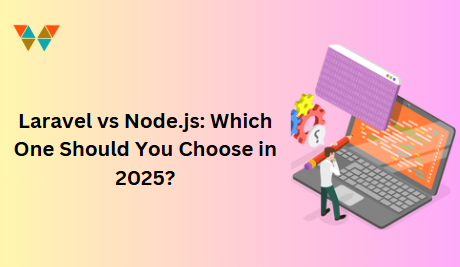Java VS JavaScript: Which One is Best For Web App Development?

Choosing between Java vs JavaScript for your project in 2024 depends on your nееds. Java offers strong typing and high performance, making it suitable for server-side applications. JavaScript is mainly used for web development and is excellent at building dynamic and attractive user interfaces.
Java and JavaScript only share some of their names. In fact, they are completely different. Understanding this difference is essential for those interested in programming. This guide details the main differences between Java vs JavaScript. Learn about the characteristics, use cases, applications and their popularity in 2024.

Java vs JavaScript
Understanding Java: A Backend Powerhouse
Java was originally developed by Sun Microsystems in 1995, but it later came into ownership of Oracle. The design objective was to be an object-oriented class-based language that had real stages of change in its journey to become one of the most reliable and robust languages, cutting with the winds to be used to create applications in large enterprise systems. At times, it’s highly applauded for the write once, run anywhere approach in the development of Java, meaning that any application developed will be able to run on any device or platform that supports the JVM.
Key Features of Java
- Platform Independent: On account of presence of JVM, applications developed by making use of Java are platform independent, meaning such applications can be executed on any OS without changing behavior.
- Object Oriented Programming (OOP): Java’s OOP model supports code reusability and makes it scalable and easier to write code in an organized manner.
- Strongly Typed Language: Java is a statically and strongly typed language; therefore, code execution will be predictable and free from errors.
- Security: In the context of the security features, Java is considered a highly secure language where data integrity and security are necessary for an application.
- Rich Ecosystem: Java boasts an enormous library, frameworks like Spring and Hibernate, and great development tools that make web application development really easier.
Java in Web App Development
Java is excellent in server-side development wherein it handles business logic, processing, and database interactions. In web application development, Java is mostly combined with the use of the Spring Framework or Java Server Pages (JSP) to create scalable, secure, and fast web applications.
Popular enterprise web applications such as banking systems, e-commerce platforms, and large data processing systems are built using Java, although they are reliable and can effectively manage any backend operations.
Understanding JavaScript: The Frontend King
JavaScript is a lightweight scripting language created by Brendan Eich in 1995 particularly for web browsers. From there, JavaScript became the de facto language of the Web and runs on practically any modern browser, giving developers the power to create dynamic and interactive user interfaces. Time passed and, via Node.js and other frameworks, JavaScript expanded into the realm outside the browser, allowing developers to run server-side applications.
Key Feature of JavaScript
- Client-Side Scripting: JavaScript is run client-side in the browser; the perfect technology for front-end programming and supports dynamic updates without reloading the page.
- Asynchronous Programming: JavaScript supports asynchronous operations, primarily callbacks, promises, and a sync/await. It empowers developers to develop non-blocking, fast-loading web applications.
- Dynamic Typing: JavaScript is loosely typed than Java; hence, it may alter the types at runtime. This gives the developers flexibility while coding.
- Event-Driven: It’s very good for dealing with user interactions, events, and behavior, which makes up a lot of the modern web application.
- Rich Ecosystem: JavaScript libraries and frameworks like React, Angular, and Vue.js have made it quite straightforward to develop elaborate and high-performance front-end applications in a really efficient way.
JavaScript in Web App Development
Undeniably, front-end development should utilize JavaScript because aside from functionality, web applications need to be interactive and user-friendly. It manages elements in a web page, which controls effects like animations and forms, real-time content changes, and many others. However, with the advent of Node.js, it is now possible to do full-stack development because JavaScript can run both front and backends of web applications. Popular web services like Facebook, LinkedIn, and Netflix support JavaScript frameworks for the development of responsive, interactive frontends.
Java vs JavaScript
Choosing the correct programming language during web application development is a very crucial decision, as it directly affects the application’s performance, scalability, and UX. Among the most popular languages are Java and JavaScript-two powerful languages but with different purposes, although their nomenclature often leads people to compare them side by side. Knowing the critical differences between these languages will help you choose one for your web development process and meet your needs. So, let us get started with the Java vs JavaScript debate to discuss their strengths, use cases, and which one to choose for your next web app project.
Syntax and Readability
Java is statically typed and object-oriented-programming-meaning developers need to explicitly declare the type of variables, making code possibly more predictable but wordier. Rules-based in syntax makes it a little challenging to get started with but assures that the code gets robust in the long term and correct in terms of errors.
On the contrary, JavaScript is dynamically typed. This means that it is more free and flexible, making it possible to prototype much faster. Its syntax is relatively simpler compared to Java, and it usually becomes easier for new users to learn, specially for the frontend development process.
Performance and Speed
Raw performance-wise, Java generally outbeats JavaScript in intense computational tasks because Java is compiled and hence efficient memory management within the JVM. Java applications are basically faster and more efficient on huge backend processes like data handling, concurrency, and multi-threading.
Since JavaScript is an interpreted language, computational and calculation operations may take more time. The event-driven architecture coupled with non-blocking I/O in operations makes JavaScript very fast when running real-time applications, like any chat application or any streaming service, specifically in the Node.js environment.
Scalability
Scalability is one of the key features of Java, mainly if one needs to develop large-scale applications. Scala’s JVM enables both vertically and horizontally scaling Java applications. Therefore, it is ideal for large-scale applications that need to support thousands of concurrent users.
JavaScript also scales well, especially if it is to be used with Node.js for backend services. However, the scalability of JavaScript tends to focus more on real-time applications where operations are asynchronous, whereas Java is suited more toward systems that require heavy backend processing.
Security Considerations
When it comes to security, Java is better known as it has many built-in security features and the JVM’s sandbox mechanism. Additionally, Java’s static typing when compiled can prevent a number of common threats such as buffer overflow or improper type assignment.
JavaScript has become more secure with passage of time, especially with the use of frameworks that enforce better coding standards; however it is vulnerable to cross-site scripting and many other client-side attacks just because it is dynamic and based on user inputs.
When to choose Java?
- Enterprise-level web applications: If you have a large system with sophisticated functionality or components that require strong backend support, performance, and scalability, then Java is the best. It really has applications in banking, healthcare systems, and e-commerce platforms.
- Android application development: This is one of the popular choices of doing Android development. In case you plan on having cross-platform compatibility across web and mobile applications, then Java will become essential for you.
- Heavy Backend Processing: Java does heavy backend processing on large databases, real-time data analytics, and processing huge amounts of data.
When to choose Java Script?
- Interactive Frontend Applications: JavaScript is best for applications that need a rich, dynamic user interface. Perfect for SPAs made on React, Angular, or Vue.js.
- Node.js Full-stack development: If you wish to apply a language in both frontend and backend, then you would be easily able to do so in an efficient manner using JavaScript with Node.js.
- Real-time web applications: For developing applications that are based on real-time concepts, like chat systems, gaming servers, and streaming services, JavaScript is more suitable along with Node.js.
Java vs JavaScript: Which One Is Best for Web App Development?
The decision finally depends on what the specific requirements are for your project. If it requires a highly scalable, secure and performance-oriented backend then go for Java. If the focus of your project is creating a rich, interactive user interface or full-stack development with a single language, then JavaScript is more suitable. Java’s reliability and scaling capabilities make it unbeatable for enterprise web applications that have heavy server logic. For agile real-time web applications, emphasis on user experience means that JavaScript can do its magic in an unprecedented way.
Conclusion
The choice on the right depends entirely on the needs of your web application; some applications require one or the other, but mostly, using both languages for Java vs JavaScript-while using Java on the backend and JavaScript on the frontend-proves to be the best way to proceed. But selecting the right kind of technology stack is only the first step. Being a best web development company, Witarist specializes in building highly performance-based web applications with Java and JavaScript. Do you need a full-stack solution, a solid backend, or a dynamic frontend? WitArist’s experienced developers take you through the entire development process in developing your web app fast, secure, and scalable.


